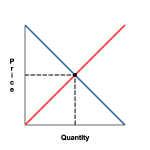There are three factors that determine the sale of a home.
- Location
- Condition
- Price
What good news! Why? You have nearly complete control over 66% of what sells a home. Granted, you cannot change the condition of the surrounding properties or the type of construction of your property. I mean, you could raze your house and rebuild a completely different style home, provided your HOA didn’t prevent it, but then you’d be throwing good money after bad as you created a home that didn’t fit the surroundings. The condition of the surrounding homes has mostly to do with location anyway, so you really do have control over most of the consumer response to your home.
There are five stages of grief that, if you are not in touch with reality, you will traverse throughout your experience selling a house. Why is this? Well, selling a home isn’t like selling off your possessions at a garage sale. Garage sales are usually designed to eliminate junk. Your home is a very personal space, and you’ve grown very attached to it, most likely.
My job is to provide you with the right information to help you make an informed decision about how you should price your home, and what you can do to improve its chances of selling.
In todays market, of the determining factors that you can control, price carries the most weight, and many sellers have fallen victim to “rear view mirror” thinking. Newsflash! The gig is up. We have to price our homes in line with what buyers are willing to pay. Remember that the value of a home is determined upon close of escrow. Asking more than it will sell for does not declare the new value on the block. The actual sale price of a neighboring like property combined with an appraisal is what is going to help you price your home properly.
Stage 1: Denial. Nobody is exempt from feeling this if their expectations are out of line. Not even real estate agents these days are pricing their properties realistically. If you enter the transaction with a realistic outlook on what your home can actually get in the marketplace, you’ll be able to avoid the denial that accompanies the let down after your property has chased the market.
Stage 2: Anger. Obviously if you’ve felt the loss of thousands of dollars (albeit on paper only, which makes the situation even crazier because you never had the money in the first place) then you’re going to experience all five phases. To what degree is determined by how quickly you can bounce back from fantasy land. You will be angry about waiting too long to sell. You’ll be angry when you realize that your Realtor was right when he/she recommended a much lower price bracket than you insisted upon. Get over it. It’s time to sell your home. Make the adjustments now and minimize your losses (remember, that didn’t even exist in the first place.) And, if you are actually experiencing more than just losses on paper, that’s all the more reason why you should price your home right, the first time.
Stage 3: Bargaining. Through your anger you’ll find yourself justifying why things are the way they are. You’ll begin to think things like, “If only I had.” “Maybe if we try this we can still salvage our…” Nope. You’re where you are now, just get it sold. Listen to your Realtor. He or she does this every day and sees people go through this process all the time. Trust us, we are here to help you move on with your lives.
Stage 4: Depression. This is where you’ll want to give up. Perhaps you might even consider taking your home off the market because you’ll find no point in selling. Most people can’t afford to hold two or more properties. Lots of people can’t even afford one property these days, especially after getting into the financial trouble that lenders allowed. You may even want to let your Realtor off the hook and find someone else to sell the home. Trust the Realtor you have. If he’s done his homework and is working hard for you, stick with it. We dread working our tails off to be a victim of the fourth stage of grief, which usually ends in you finding another Realtor who advises you to drop your price only to sell where your first Realtor had already suggested you price your home.
Stage 5: Acceptance. If you’re a healthy person, you’ll probably make it here quickly. In fact, if you’re a healthy person, you will probably avoid this entire process of grief through the idea of losing your yet unrealized equity gains in your home.
I can’t stress enough how important it is to price your home to sell. If you’re serious about selling your house, think about the cost in your lives of the process of selling. You may own two homes, you may have added utility bills through the process…you name it. The cost of pricing your home too high can last far longer than it’s worth. Your time is important. If you’re not actually serious about selling your house, then you probably shouldn’t list it at all.
Are you happy with your real estate situation? If not, please give me a call and I’ll help you move from point A to point B in as few steps as possible so you can go about the business of living and enjoying your life.
 Don’t panic. It’s not really a blackout, but for the days July 25th, 26th, and 27th, no changes will happen in the MLS system at all. Your Realtor will have full search capabilities and you’ll be able to see your Portal, but during that time, no changes will be able to occur.
Don’t panic. It’s not really a blackout, but for the days July 25th, 26th, and 27th, no changes will happen in the MLS system at all. Your Realtor will have full search capabilities and you’ll be able to see your Portal, but during that time, no changes will be able to occur.



